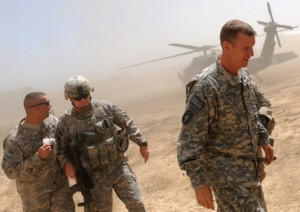
Within 24 hours of the leak of the Afghanistan assessment to The Washington Post, General Stanley McChrystal's team fired its second shot across the bow of the Obama administration. According to McClatchy, military officers close to General McChrystal said he is prepared to resign if he isn't given sufficient resources (read "troops") to implement a change of direction in Afghanistan:
Adding to the frustration, according to officials in Kabul and Washington, are White House and Pentagon directives made over the last six weeks that Army Gen. Stanley McChrystal, the top U.S. military commander in Afghanistan, not submit his request for as many as 45,000 additional troops because the administration isn't ready for it.In the last two weeks, top administration leaders have suggested that more American troops will be sent to Afghanistan, and then called that suggestion "premature." Earlier this month, Adm. Michael Mullen, the chairman of the Joint Chiefs of Staff, said that "time is not on our side"; on Thursday, Secretary of Defense Robert Gates urged the public "to take a deep breath."
In Kabul, some members of McChrystal's staff said they don't understand why Obama called Afghanistan a "war of necessity" but still hasn't given them the resources they need to turn things around quickly.
Three officers at the Pentagon and in Kabul told McClatchy that the McChrystal they know would resign before he'd stand behind a faltering policy that he thought would endanger his forces or the strategy.
"Yes, he'll be a good soldier, but he will only go so far," a senior official in Kabul said. "He'll hold his ground. He's not going to bend to political pressure."
On Thursday, Gates danced around the question of when the administration would be ready to receive McChrystal's request, which was completed in late August. "We're working through the process by which we want that submitted," he said.
The entire process followed by the military in implementing a change of course in Afghanistan is far different, and bizarrely so, from the process it followed in changing strategy in Iraq.
For Afghanistan, the process to decide on a course change began in March of this year, when Bruce Reidel was tasked to assess the situation. This produced the much-heralded yet vague "AfPak" assessment. Then, in May, General David McKiernan was fired and replaced by General McChrystal, who took command in June. General McChrystal's assessment hit President Obama's desk at the end of August, almost three months after he took command. And yet now in the last half of September, the decision on additional forces has yet to be submitted to the administration.
Contrast this with Iraq in the fall of 2006. Secretary of Defense Donald Rumsfeld was fired just one day after the elections in early November. The Keane-Kagan plan for Iraq was submitted to President Bush shortly afterward, and encompassed both the assessment of the situation and the recommended course of action, including the recommended number of troops to be deployed to deal with the situation. General David Petraeus replaced General George Casey in early February 2007, and hit the ground running; the surge strategy was in place, troops were being mustered to deploy to Iraq, and commanders on the ground were preparing for and executing the new orders. The first of the surge units began to arrive in Iraq only weeks later, in March.
Today, the military is perceiving that the administration is punting the question of a troop increase in Afghanistan, and the military is even questioning the administration's commitment to succeed in Afghanistan. The leaking of the assessment and the report that McChrystal would resign if he is not given what is needed to succeed constitute some very public pushback against the administration's waffling on Afghanistan.
By September 21, 2009 4:17 PM
No comments:
Post a Comment